Pakistan’s top court restores limits on anti-corruption agency in key ruling
Supreme Court dismissed jailed former premier Imran Khan’s request to declare amendments unconstitutional

Aamir Abbasi
Editor, Islamabad
Aamir; a journalist with 15 years of experience, working in Newspaper, TV and Digital Media. Worked in Field, covered Big Legal Constitutional and Political Events in Pakistan since 2009 with Pakistan’s Top Media Organizations. Graduate of Quaid I Azam University Islamabad.

Wahid Ashraf
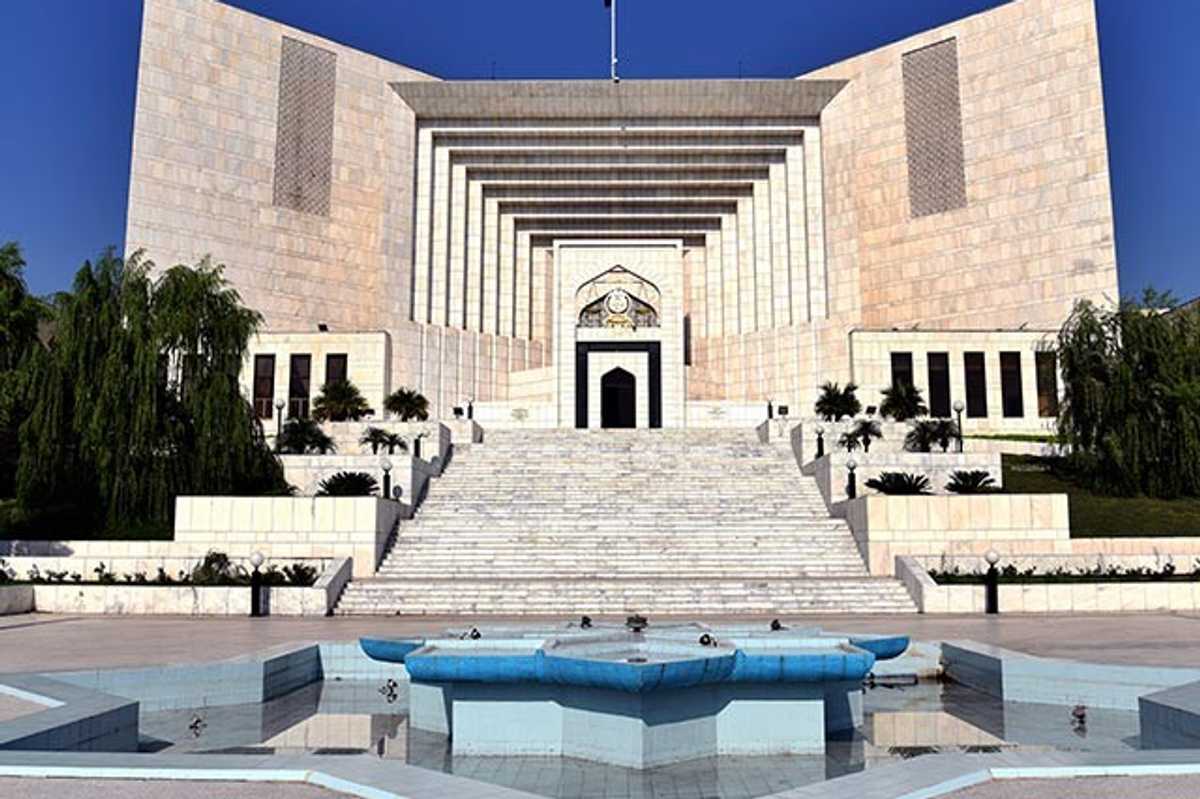
A picture of the Supreme Court of Pakistan.
Courtesy: supremecourt.gov.pk/photo gallery
Ruling emphasizes neither chief justice nor judiciary gatekeepers of parliament
Legal community split, raises concerns about ruling's implications
After much legal wrangling, the Supreme Court (SC) of Pakistan with a 5-0 majority reinstated legal amendments curtailing the powers of the country’s controversial anti-corruption body, the National Accountability Bureau (NAB).
The decision reverses an earlier ruling by a former chief justice of Pakistan, Umar Ata Bandial, from September 2023, who had invalidated those changes.
The federal government's successful appeal marks a significant legal and political shift.
The amendments were initially introduced in by the coalition government – the Pakistan Democratic Movement (PDM) – that took on the reins of power following the ouster of now-incarcerated premier Imran Khan’s government. It was passed by a joint sitting of the parliament held on June 9, 2022.
The PDM was an alliance of multiple political parties founded on ‘poll rigging’ grievances in the 2018 elections, which Imran-led Pakistan Tehreek-e-Insaf (PTI) won with a landslide. However, it was mainly led by the incumbent ruling parties the Pakistan Muslim League-Nawaz (PML-N) and Pakistan Peoples Party (PPP).
As per the PDM, the amendments were introduced to reform the NAB's jurisdiction and operational scope, limiting its authority over certain cases.
The political dynamics behind the amendments were perhaps shaped by the ‘politically-motivated’ corruption cases the coalition parties say they had to face as powerful quarters allegedly paved the way for Imran’s government.
Nevertheless, the amendments were challenged in the court by Imran on July 23, 2022. The PTI founding chairman maintained that he would "virtually eliminate any white-collar crime committed by a public office holder".
The verdict
Hundreds of corruption cases registered against the PPP and PML-N’s top leadership in NAB courts come to an end with the restoration of the amendments.
The decision was reserved on June 6 by a bench comprising Chief Justice of Pakistan Qazi Faez Isa, Justice Amin-ud-Din Khan, Justice Jamal Khan Mandokhail, Justice Athar Minallah, and Justice Hasan Azhar Rizvi.
Although a unanimous decision, Justice Minallah and Justice Rizvi have disagreed on a few points. Both the judges will release detailed notes regarding their arguments at a later date.
Following today’s ruling, NAB can only take up cases involving amounts over Rs500 million. All other ongoing inquiries, investigations, and trials less than this amount will be transferred to the relevant authorities.
Bail provisions have also been revised. Individuals accused of corruption can now be detained for 40 days before applying for bail. However, the amendments allow the accountability courts to also grant bail now. Additionally, public office holders will only face trial if it is proven that they misused their authority for personal financial gain.
In the 16-page judgment, the apex court has said that it cannot serve as a gatekeeper for parliament, emphasizing that neither the chief justice nor judges can assume this role. The ruling further noted that the court should preserve legislation in every possible manner.
Rejecting the ex-premier’s request to declare the amendments unconstitutional, the SC observed, “Mr. Niazi did not approach this Court in a bona fide manner and his antecedents also prevented him from challenging the Amendments, many provisions whereof were the same as those in the Amending Ordinances, promulgated by the President of Pakistan on his advice”.
The Supreme Court also reaffirmed that legislating was solely the prerogative of parliament, and declared that, “The Constitution distributes functions amongst the different constitutional bodies that are set up thereunder, including the legislature, the primary function of which is to make laws”.
Criticizing the earlier judgment of the former chief justice, CJP Isa noted that, “The impugned judgment did not test the Amendments on the touchstone of the Constitution, it instead proceeded to consider the Amendments by applying their lordships’ own criteria and yardstick, which, with respect, was not permissible in terms of the Constitution”.
The court also noted that during the proceedings Imran and his lawyer were not able to convince the court on how the amendments violated fundamental rights.
The debate
The apex court’s decision has ignited a debate among the legal community. Lawyers are split, and many have raised concerns about the ruling's implications.
Critics argue that although NAB's performance has been questionable, the government's recent amendments lack legal validity.
Speaking to Nukta, Supreme Court lawyer Asad Rahim said, “NAB had become an instrument of coercion and was clearly in need of reform.” However, he added that the PDM government’s solution—gutting the entire institution through person-specific amendments—was blatantly illegal, aimed at benefiting a small segment of the political elite by dismissing cases against themselves.
“The court has essentially legitimized an act of desperation on the grounds that public rights have not been affected. This is like Nero playing the lyre. By the same logic, the Supreme Court should have ruled against the National Reconciliation Ordinance, which similarly involved undemocratic forces sanitizing politicians to form a government,” Rahim added.
Senior top court lawyer Barrister Salahuddin Ahmed however offered a different perspective. “The original judgment didn’t clearly outline how the NAB amendments were unconstitutional or which specific fundamental rights were violated. It seemed driven more by judicial frustration with ‘corrupt politicians’ than by a detailed analysis of the law’s constitutionality. This has been appropriately corrected in appeal,” he stated.
Another apex court lawyer, Mustafa Ramday, noted that “the five-member bench, with two justices dissenting on the reasoning, dismissed Imran Khan’s challenge regarding the legislature’s authority to enact legal reforms.”
“The three judges out of the five have opted to ignore the submissions of the appellants and the defendants by declaring that since the challenge falls short with respect to constitutionality and legality hence the legal submissions need not be commented upon. The three of the five lordships have also reiterated that the SC is not a gatekeeper of the Parliament.”
Speaking outside the SC following the announcement of the verdict, PTI leader Shibli Faraz also accused the PDM coalition of amending NAB laws for the PPP and PML-N’s benefit.

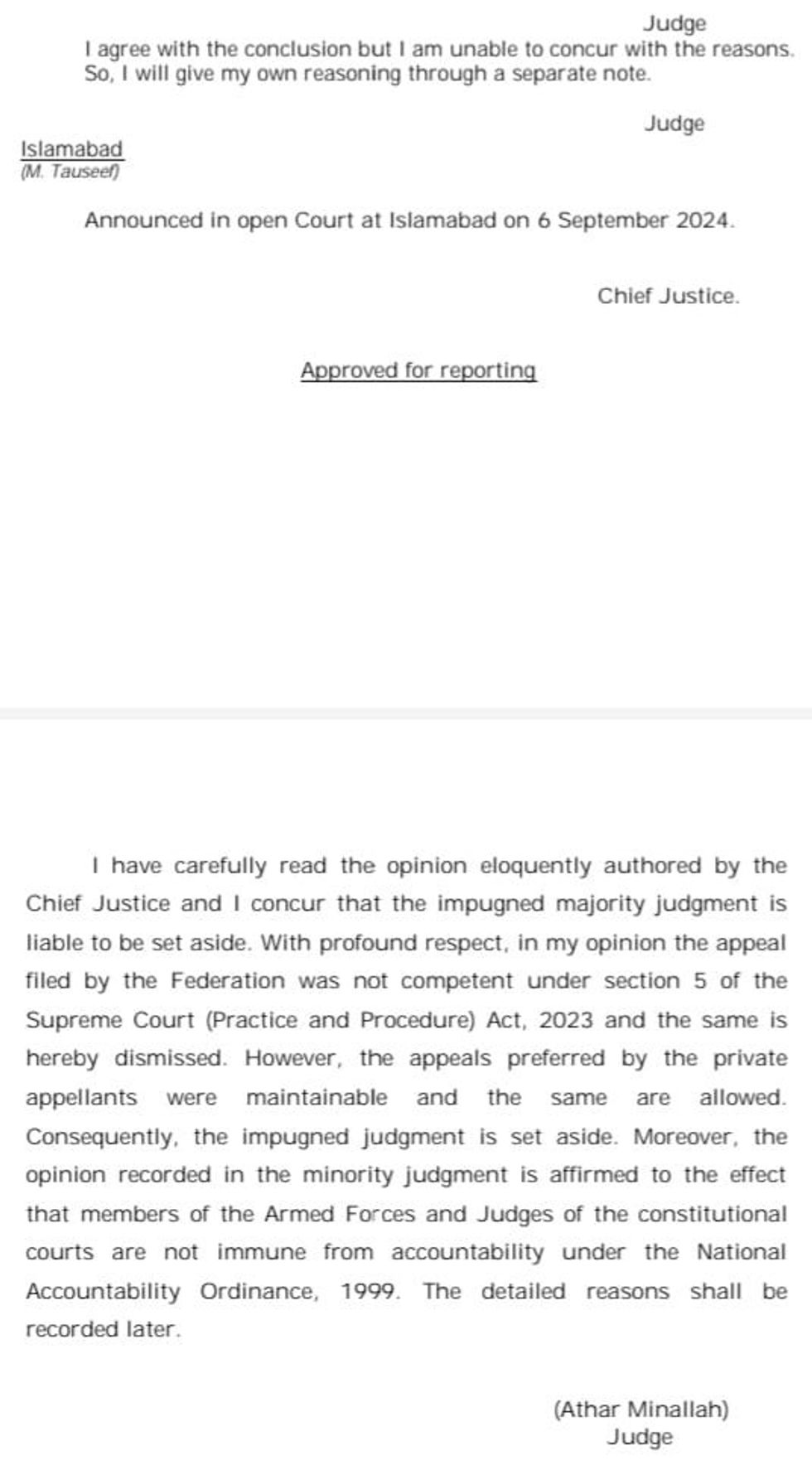
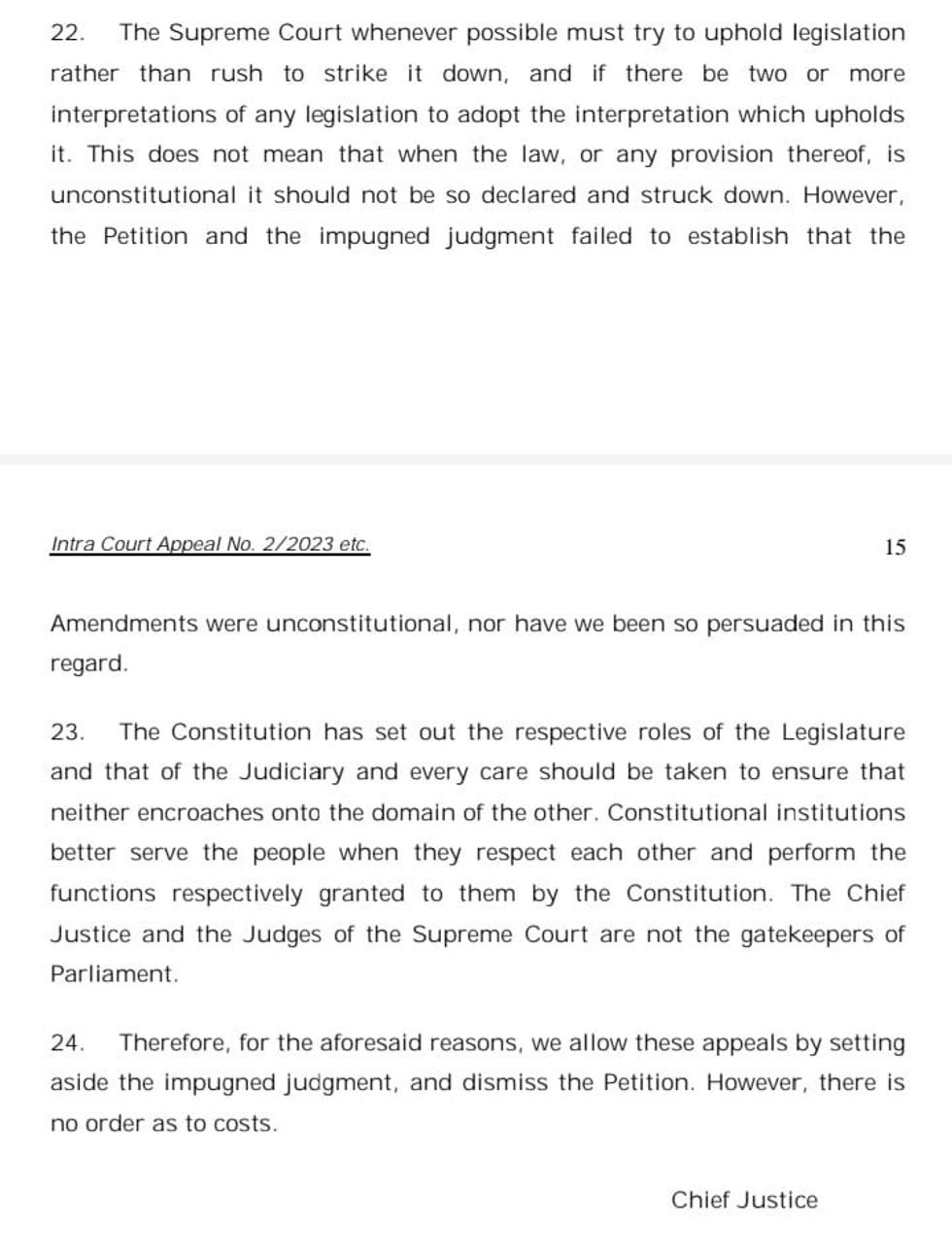
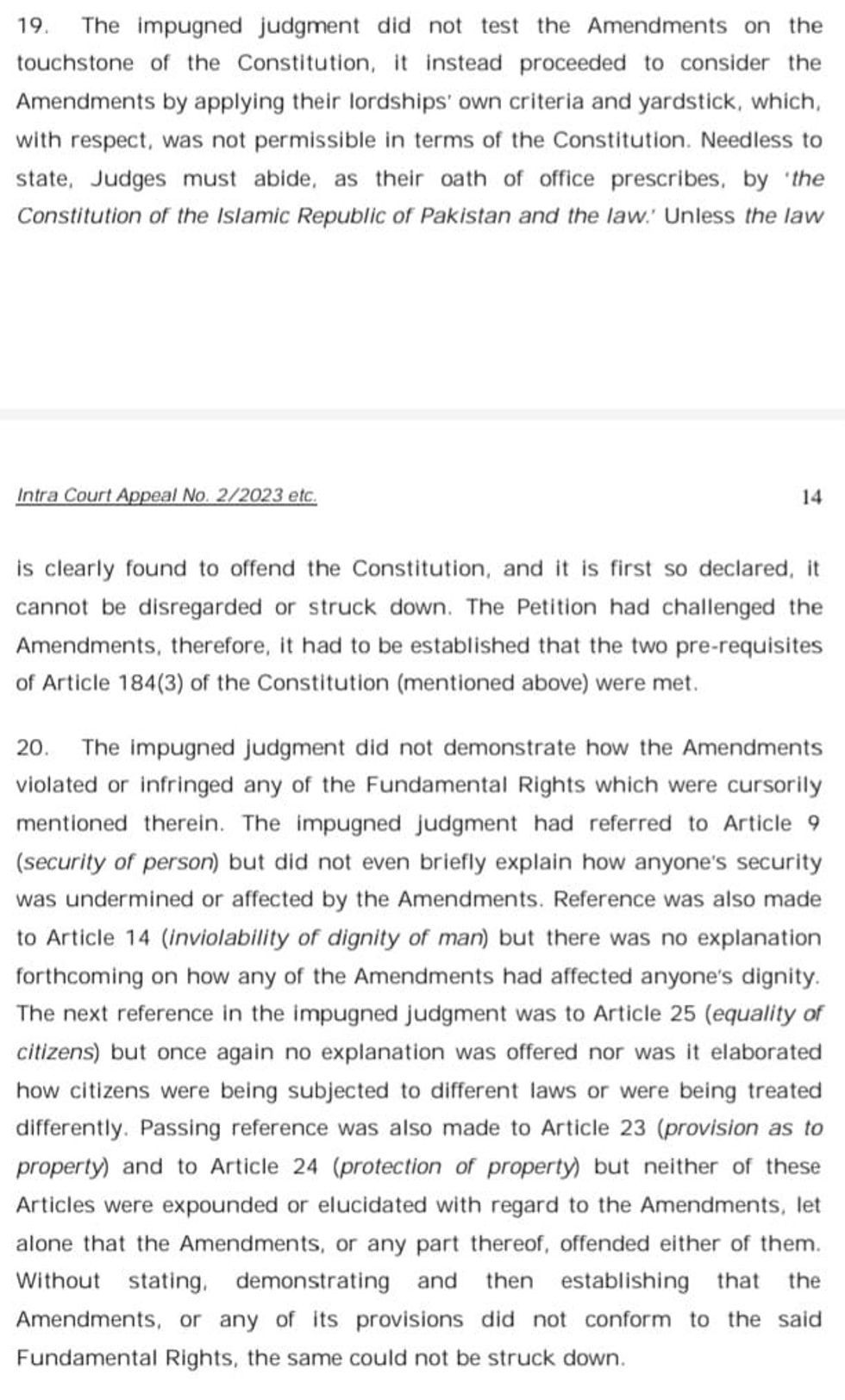



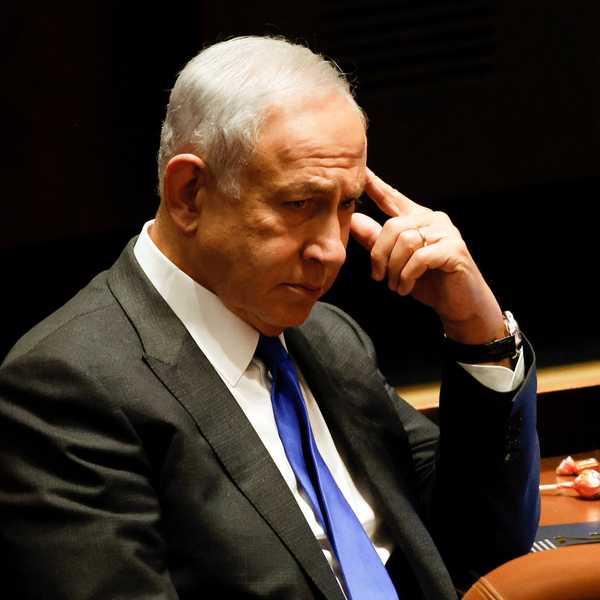

Comments
See what people are discussing